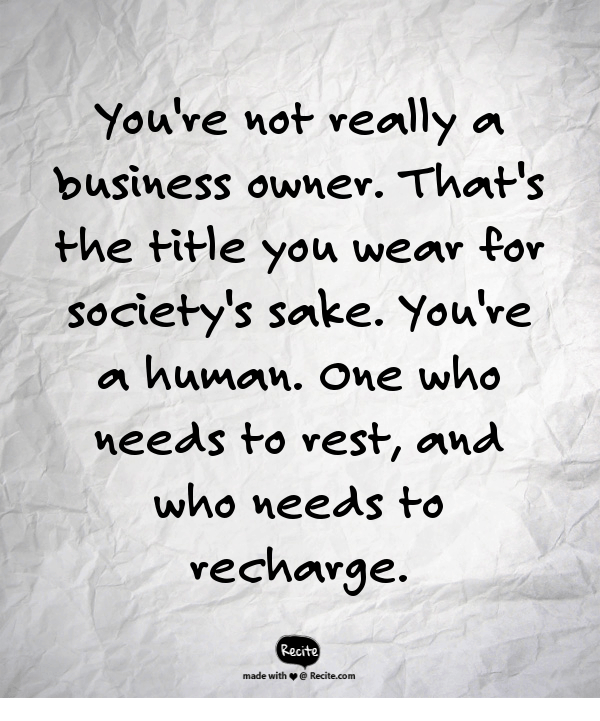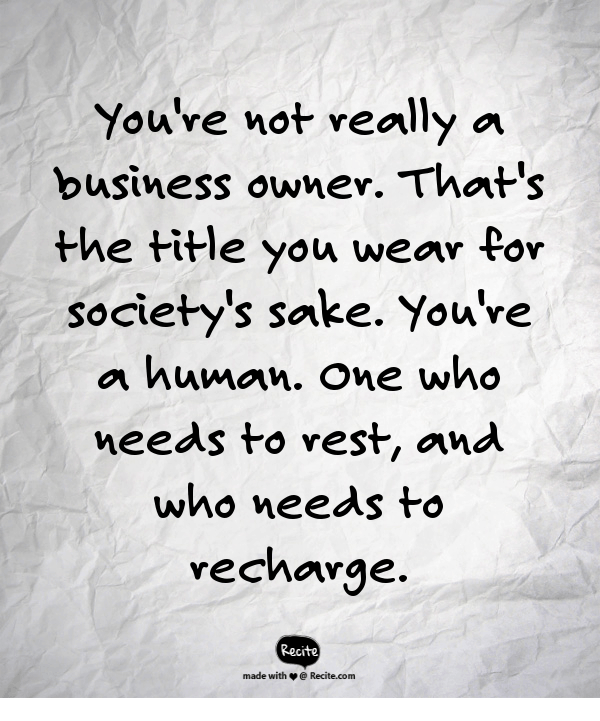Steve Jobs once said deciding what not to do is as important as deciding what to do. It makes sense on the surface. But it’s tough to put the benefits of that philosophy into action, especially for entrepreneurs. Taking down time when you’re self-employed inherently means your income and opportunities come down a notch or two in tandem. If you’re central to your business model, turning down opportunities may mean saying no to a certain amount of money. Detaching from your email for several days may mean you miss a client’s urgent need that someone else is more than willing to swoop in and serve.
These are the facts of relying on yourself and your efforts for income. Concerns associated with them are legitimate. There are no guarantees and no safety nets when you own a business.
But there’s another fact. Regardless of how successful your company, the size of your staff, or the revenue you generate, you are not your business. You’re not really a business owner. You’re not really an entrepreneur. That’s just the title you wear for society’s sake.
So what are you? A human. One who needs to rest, and who needs to recharge. You can track your steps, improve your endurance, build your myelin, lower your resting heart rate, optimize your sleep schedule, and micromanage your caloric intake all you want but you cannot game the truth of life. At some point, you have to take a break. No one can outrun, escape or deny this fact.
For those of use who have deep pride in our ability to do it all and then some, admitting we’re mere mortals feels threatening. Insulting, even. But when you choose to deny this fact, there’s just one person to blame when you eventually feel totally and utterly burned out.
I don’t care how much you love your job. I don’t care if you’re at the top of your game. You need to say no to some projects. It’s the only way to have the mental and emotional reserves you need to tackle the really major opportunities you want to “yes” to with your full potential.
But you don’t have to take my word for it. Here’s what the science says about the health benefits of taking the occasional vacation.
Vacations can extend your life. Travel doesn’t just give you an opportunity to step out of the routine of your daily life, it can extend the quality and duration of it. According to “Destination Healthy Aging: The Physical, Cognitive and Social Benefits of Travel” a joint study conducted by the Global Coalition on Aging and Transamerica Center for Retirement Studies (TCRS) , women who vacationed every six years or less had a significantly higher risk of developing a heart attack or coronary death, compared to women who vacationed at least twice a year.
Time off reconnects you with people. When’s the last time you had a meal or conversation with someone without a smartphone within arm’s reach? People and your ability to have relationships with them are everywhere. Put down your phone, and look around every once in awhile. A recent survey conducted by the U.S. Travel Association revealed that 83% of those who travel as a couple said the romance is still alive in their relationship; 72% of the couples surveyed said their travels actually inspire more romance. Relationship expert and author April Masini says vacations can also provide a renewed sense of connection to the outside world for single ladies. “Mental health sags when relationships falter or fail to surface for singles. Travel gives you something in common with others, and that commonality not only makes you feel good about yourself, it binds you to people with similar interests.”
You’ll lower your stress. “Vacations help us reduce cortisol levels that assist female hormones to come back in sync (high cortisol deregulates hormones), and allows us to disconnect so we can recover. This leads to greater levels of happiness and pleasure–important ingredients for successfully managing stress and going the distance with our bigger professional goals,” says women’s health and success coach Jennifer Racioppi. Vacation also tends to make us more open to simple activities like a morning walk to get coffee, which deliver benefits beyond health. In the study “Give Your Ideas Some Legs: The Positive Effect of Walking on Creative Thinking,” researchers who measured the creativity levels of stationary test-takers against those who completed tasks in motion found that walking (especially outdoors) improves creativity—and has lasting residual effects. “Incorporating physical activity into our lives is not only beneficial for our hearts–but our brains as well,” says study co-author Marily Oppezzo, PhD.


